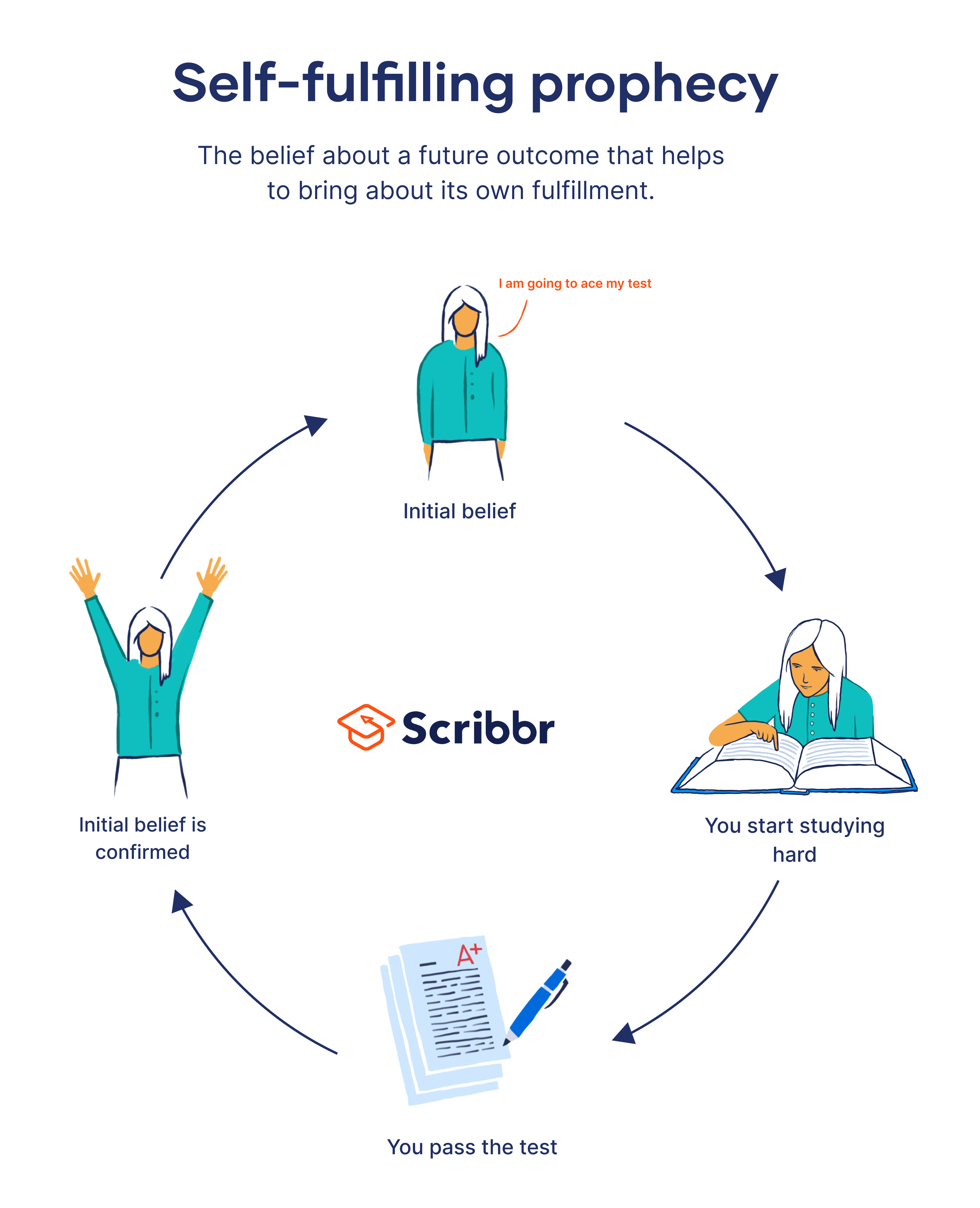Self-Fulfilling Prophecy | Definition & Examples
A self-fulfilling prophecy is a belief about a future outcome that helps to bring about its own fulfillment. This happens because the unconscious expectations that we hold can influence our actions and ultimately cause the initial prediction to become true.
However, you’re not surprised because you already believed that it would go terribly. This is a self-fulfilling prophecy at work: when we are convinced about a negative outcome, we do very little to prevent it from happening. Because of this, it becomes a reality.
Self-fulfilling prophecies can be either negative or positive and can influence outcomes in various contexts, such as education, healthcare, and work.
What is a self-fulfilling prophecy?
A self-fulfilling prophecy is a psychological phenomenon whereby something happens because we expect it to happen. Self-fulfilling prophecies are based on a belief or expectation (correct or incorrect) that influences our actions in such a way that the original belief or expectation becomes true. This influence can be either negative or positive.
For example, if you believe a job interview will go well, you may be more likely to prepare well or answer the questions with confidence. In contrast, if you feel certain that you will fail an exam, you may prepare less. In both scenarios, your actions can bring about consequences that cause reality to match your initial belief.
Self-fulfilling prophecies may affect both individuals and groups. For example, this is sometimes the case with stereotypes. A negative preconceived notion about a socially vulnerable group, like drug addicts or immigrants, can cause us to treat members of this group in a harsh or indifferent way. This, in turn, will cause them to react negatively to us, reinforcing the initial negative stereotype.
Types of self-fulfilling prophecies
There are two types of self-fulfilling prophecies:
Self-imposed prophecies
These prophecies occur when the beliefs we hold about ourselves influence our own behaviors and actions. Our beliefs can be either negative and limiting or positive and motivational.
Those placed in the control group are administered the placebo (e.g., a pill or injection with no therapeutic properties). Scientists then compare the results of the two groups to see if they differ.
In many cases, participants on the placebo report an improvement. Because the placebo is an inactive treatment, scientists attribute the beneficial effects reported (known as the placebo effect) to the participants’ belief that they are being treated.
Other-imposed prophecies
These prophecies occur when others’ expectations influence our behavior and actions. For example, a parent who views their child as either “bright” or “lazy” may also treat them accordingly. As a result, the child’s behavior may be positively or negatively influenced by their parent’s expectations.
In a seminal study, researchers wanted to find out how teachers’ expectations impact student performance. At the beginning of the year, after administering a test, they told teachers that certain students showed a lot of potential and were expected to excel under proper guidance. However, the teachers did not know that the “promising” students were, in fact, randomly selected.
Several months later, the researchers returned and tested the children again. They found that the students who were identified as “promising” showed a greater improvement in academic skills than their peers. Because teachers expected certain students to excel, they treated them differently (e.g., they dedicated more time and effort to them). This, in turn, not only affected their abilities but also the way they viewed themselves.
The Pygmalion effect shows that our beliefs about others can lead us to treat them in such a way that they subsequently become what we expect them to be.
How does a self-fulfilling prophecy work?
A self-fulfilling prophecy is a cyclical process consisting of four stages:
- First, we form a belief or expectation about a future outcome. This may concern ourselves (e.g., “I will ace the upcoming test”) or others (e.g., “my coworkers don’t like me”).
- This belief influences our attitude towards the situation (e.g., studying hard for the test) or our behavior towards other people (e.g., avoiding talking to colleagues). Our expectations can be expressed verbally or nonverbally.
- Our attitude and actions shape how others view us. This is reflected in their behavior towards us (e.g., our coworkers also avoid us) or in the feedback we get from the situation (e.g., we pass the test).
- Our initial belief is confirmed, our behavior is reinforced, and the self-fulfilling prophecy becomes a reality.
Self-fulfilling prophecies are a prime example of how our thoughts and beliefs can bring about consequences that we expected or feared (even if it is at the subconscious level).
Self-fulfilling prophecy example
Self-fulfilling prophecies can affect our relationships with others in unconscious ways.
Your partner interprets this behavior as a lack of interest and eventually the relationship fizzles out. When this happens, you feel that you have been proven right. However, your initial assumption most likely influenced your behavior and ultimately caused the relationship to end.
Other types of research bias
Frequently asked questions
- How can you avoid a self-fulfilling prophecy?
-
Self-fulfilling prophecies work at a subconscious level and can be hard to overcome. However, you can take the following steps to avoid their negative impact:
- Become aware of self-fulfilling prophecies. In other words, identify patterns of thoughts and actions. The first step is to realize that harboring negative thoughts prevents us from putting our best foot forward.
- Reframe your language. Avoid using absolute words or statements like “never” or “I can’t,” and try to replace them with neutral or positive phrases (e.g., “I’ll do my best”).
- Work towards a growth mindset. Start cultivating the belief that your abilities, talents, and knowledge are not fixed and can be improved over time.
- What is the observer-expectancy effect?
-
The observer-expectancy effect occurs when researchers influence the results of their own study through interactions with participants.
Researchers’ own beliefs and expectations about the study results may unintentionally influence participants through demand characteristics.
The observer-expectancy effect is often used synonymously with the Pygmalion or Rosenthal effect.
Cite this Scribbr article
If you want to cite this source, you can copy and paste the citation or click the “Cite this Scribbr article” button to automatically add the citation to our free Citation Generator.
Nikolopoulou, K. (2023, October 23). Self-Fulfilling Prophecy | Definition & Examples. Scribbr. Retrieved November 3, 2023, from https://www.scribbr.com/research-bias/self-fulfilling-prophecy/

